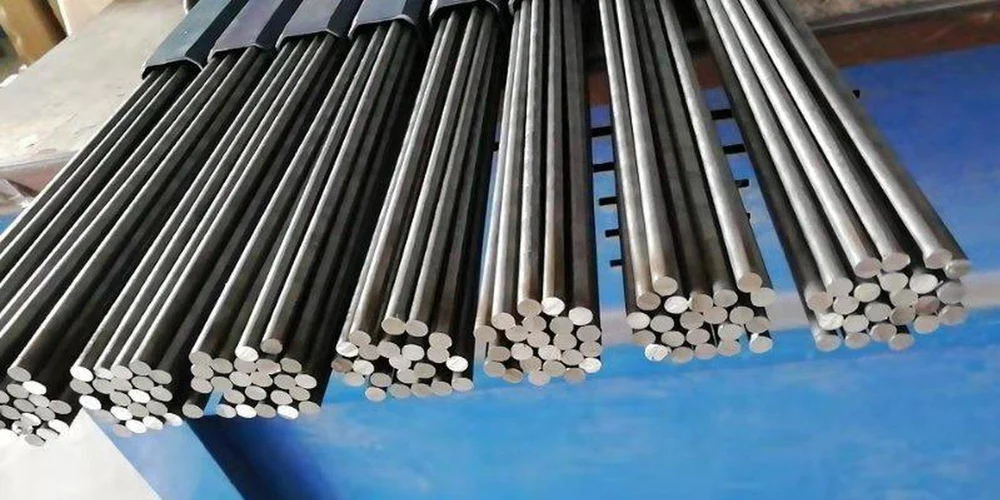
HAYNES 242, also known as UNS N10242 or ASTM 5873, is a high-performance nickel-cobalt-chromium alloy designed for high-temperature applications. Recognized under ASTM B575 and W.NR.2.4665, it provides exceptional strength, oxidation resistance, and thermal stability.
HAYNES 242 is engineered for use in environments where superior resistance to thermal and oxidative degradation is required. Its unique composition allows it to maintain high mechanical properties and stability at elevated temperatures.
Haynes 242 Sheet | Plate
HAYNES 242 sheets and plates are available in various thicknesses and sizes. These materials are used in applications requiring high strength and resistance to extreme temperatures, such as aerospace, power generation, and chemical processing industries.
Haynes 242 Round Bar | Rod
HAYNES 242 round bars and rods come in different diameters and lengths, suitable for precision machining and manufacturing components that must withstand high stresses and temperatures.
Haynes 242 Strip | Coil
Offered in strips and coils, HAYNES 242 is suitable for applications needing flexible, high-strength materials. These forms are often used for manufacturing gaskets, seals, and other components that must perform reliably in demanding environments.
Haynes 242 Applications
- HAYNES 242 is used in aerospace applications for components requiring high-temperature strength and oxidation resistance.
Haynes 242 Properties
- Tensile Strength: HAYNES 242 exhibits high tensile strength, making it ideal for components under significant mechanical stress at elevated temperatures.
- Density: Approximately 9.05 g/cm³, offering a good strength-to-weight ratio for demanding applications.
- Thermal Conductivity: Moderate thermal conductivity ensures stability and performance in high-temperature conditions.
- Oxidation Resistance: The alloy provides excellent resistance to oxidation and scaling, extending the lifespan of components.
- Corrosion Resistance: HAYNES 242 has superior resistance to various corrosive environments, including acidic and basic conditions.
Machining Haynes 242
- Cutting: HAYNES 242 can be cut using carbide tools or high-speed steel. Techniques such as water jet cutting or laser cutting are recommended for precision work.
- Drilling: Use carbide drills for drilling HAYNES 242. Proper cooling and lubrication are essential to maintain tool life and ensure accurate drilling.
- Turning: Carbide inserts are preferred for turning HAYNES 242. Consistent cutting speeds and high-pressure cooling are crucial for optimal results.
- Milling: Milling operations should use carbide end mills with adequate cooling to manage heat and maintain precision during processing.
- Grinding: For grinding HAYNES 242, use diamond or CBN wheels to achieve precise tolerances and a high-quality surface finish. Adequate cooling is necessary to prevent overheating and maintain dimensional accuracy.
Chemical Composition
- Carbon (C): Max 0.03%
- Manganese (Mn): Max 0.80%
- Silicon (Si): Max 0.80%
- Chromium (Cr): Min 7.00%, Max 9.00%
- Iron (Fe): Max 2.00%
- Aluminum (Al): Max 0.50%
- Boron (B): Max 0.006%
- Copper (Cu): Max 0.50%
- Molybdenum (Mo): Min 24.00%, Max 26.00%
- Cobalt (Co): Max 2.50%
- Nickel (Ni): Balance
| Material | Form | Size Inches | SKU Number |
|---|---|---|---|
| HAYNES 242 | Sheet | Thickness: 0.020" to 0.500"; custom widths and lengths | HAYNES242-SHEET-0.125-12x12 |
| HAYNES 242 | Plate | Thickness: 0.500" and up; custom sizes | HAYNES242-PLATE-0.750-24x24 |
| HAYNES 242 | Bar/Rod | Diameter: 0.250" to several inches; length up to 36" or more | HAYNES242-BAR-1-36 |
| HAYNES 242 | Tube/Pipe | Diameter: 0.5" to several inches; custom wall thickness | HAYNES242-TUBE-1-0.125 |
| HAYNES 242 | Wire | Diameter: 0.010" to 0.250"; often supplied in coils | HAYNES242-WIRE-0.050-100 |
| HAYNES 242 | Custom Fabrications | Custom dimensions and shapes as required | HAYNES242-CUSTOM-FAB-001 |
